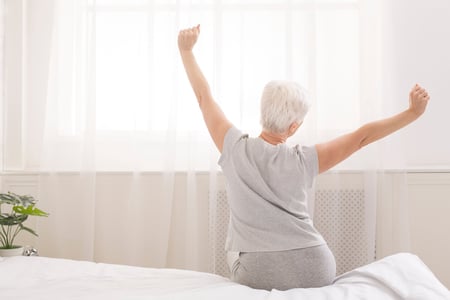
During the winter months, the cold and flu are at the forefront of everyone’s mind. Especially after coronavirus, people are more mindful than ever to wash their hands, avoid touching their face, and sanitize surfaces to prevent catching germs and bacteria that may cause the flu or a cold.
Pneumonia, however, is typically more severe than just a cold, especially for older adults. So not only is it essential to do your best to prevent these viruses in an older loved one, but it’s just as important to know the signs of symptoms or pneumonia so you can ensure they are treated as quickly as possible.
Brickmont Assisted Living is dedicated to the health and wellness of older adults. Our assisted living and memory care communities throughout Atlanta, Georgia, offer safe and clean environments for individuals. We’re sharing some helpful information about pneumonia so you can ensure your family member’s health and wellness this winter.
What is Pneumonia?
Pneumonia is an infection that inflames the air sacs within the lungs. In many cases, the infection fills the air sacs with fluid, causing the recognizable wet and heavy cough associated with the sickness.
Pneumonia can range in seriousness: most healthy adults recover quickly, but it can be more dangerous for infants, seniors, and those with a weakened immune system.
Importance of Catching Pneumonia Early
While pneumonia can impact anyone, some of the most significant risk factors include age, the presence of a chronic disease like COPD or heart disease, and a recent stay in the hospital—all factors that impact older adults at a higher rate.
This, combined with the fact that pneumonia has a more severe impact on adults, makes it vital to know the signs and symptoms to catch the disease early.
Must-Know Signs and Symptoms
Pneumonia can be hard to identify in adults as many of the symptoms mimic those of a basic cold or a pre-existing chronic condition. Sometimes, your older family member may not communicate their symptoms or let you know how they are feeling, so you may have to observe them and see for yourself. Here are some warning signs to look for in your older loved one:
- Feeling generally tired, fatigued, or weak: This might be the first symptom that you notice. Your parent might look tired or rundown. They may even seem physically weak or stumble when they try to walk. Of course, fatigue can always indicate other illnesses, so it’s important to pay attention to other symptoms, as well.
- Sweating, chills, or a fever (or a lack of a fever): Pneumonia will typically present with a fever in younger adults. However, it’s not uncommon for older adults to have a lower average body temperature. When they have an infection like pneumonia, it’s possible that their temperature could get even cooler.
- A heavy, persistent cough: A wet, mucusy cough is what most people associate as the telltale sign of pneumonia. Pay attention to a cough that lasts for more than a few days or produces any phlegm or mucus.
- Chest pain or shortness of breath: This may be more difficult for you to observe on your own, but if you notice your family member clutching their chest or having difficulties breathing, it could be a sign.
- Feeling confused or delirious: Often seen in older adults, infection or a virus can cause brief moments of confusion or delirium. As a result, they may become disoriented, agitated, or restless.
When to See a Doctor
Since pneumonia can be so threatening to older adults, it’s essential to take them to their health care provider as soon as you notice symptoms.
Depending on the type of pneumonia, their doctor may prescribe antibiotics (bacterial pneumonia can be treated with antibiotics; viral pneumonia cannot). If not, they may recommend hydration, rest, and pain relief partnered with close monitoring.
Preventing Pneumonia
Like other viruses and bacterial infections, the best way to prevent pneumonia in seniors is to make healthy lifestyle choices that will boost the immune system, like:
- Eating well
- Being physically active
- Getting adequate sleep
In addition, adults over 65 are strongly encouraged to get both the pneumococcal and the influenza vaccine every year as they can largely protect against these viruses.
Protecting Your Loved One This Winter
While you shouldn’t be living in fear that your older family member will get pneumonia, it is something to be taken seriously. Older adults are at a higher risk of contracting pneumonia and experiencing complications because of it.
Because of these risks, it’s vital that you and your family member’s caregivers know the signs of pneumonia and when to visit the doctor. By having healthy habits, getting vaccinated, and being informed, you can prevent and manage pneumonia in an older loved one.
Brickmont is Devoted to Wellness
At Brickmont Assisted Living, we are passionate about the health and wellness of older adults. Our assisted living and memory care communities serve Atlanta, Georgia, and work to establish environments where individuals can not only be healthy but also engaged, involved, and loved. For more information on our communities and care philosophy, visit our website!




.png)